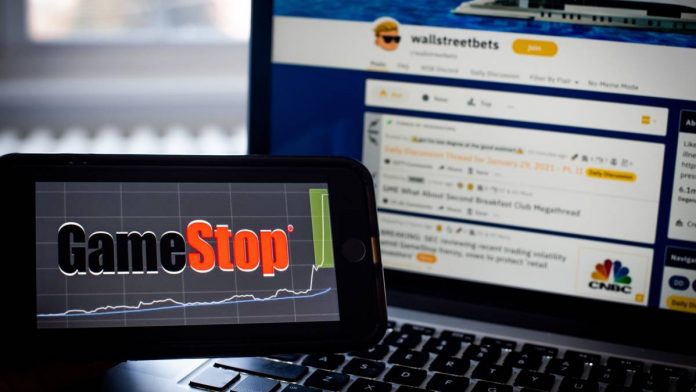
The share price of GameStop has soared by around 8000 % in 6 months.
GameStop is a video game retailer with 5000 physical stores across the United States. It has been struggling for years as people have moved online to buy games. Therefore, large institutional investors like hedge funds have been betting against it.
Even then, its stock has increased by more than 1800 % since 1st January 2021. On 26 January this year, the stock closed at $145.60, then increased to $345.00 on 27 January, peaking at $469.42 on 28 January.
The price rise has been fuelled by individual retail investors on a Reddit forum ‘WallStreetBets’ who have banded together to buy shares in the company. The group has around 2 million subscribers and they have managed to trigger a short squeeze in the market.
What is short selling and short squeeze? Investors usually try to buy shares when the price is low and sell them when the price is high to make profits. If they expect that the share price of a company is going to fall (let’s say from Rs.100 to Rs.80), they can borrow shares from someone else (usually a broker) and sell them for Rs.100, in the expectation of buying back the shares at Rs.80 and returning them to the lender. This way they can make a profit of Rs.20. (before deducting the rent owed to the lender of the shares).
Many large institutional investors like hedge funds were betting against Gamestop as it was struggling.
But, in the year 2020, Ryan Cohen, founder of pet food site chewy.in bought a 12.9 % stake in Gamestopfor $79 million. He also made a proposal to the board to take Gamestop online and focus on e-commerce. Later, he and two of his associates were inducted into the board. This made some of the small individual investors to be bullish on the company. (the expectation that the price will rise).
Some of these investors on the Reddit forum saw this as an opportunity to wage a war against large wall-street investors by creating a short squeeze. They influenced each other’s buying decisions.
Apart from Gamestop, they applied this tactic on other stocks like Blackberry and AMC. These are the stocks that wall street investors were betting against.
So, let’s say the price of the company doesn’t fall from Rs.100 to Rs.80 as expected by the short-sellers. Instead, it begins to rise. Then the short sellers will try to buy the shares from the market to cover their short positions and minimize their losses. In doing so, they will drive up the prices even higher as the demand for the stock will increase.
This is what happened with GameStop
GameStop short-sellers have losses of nearly $20 billion so far this year.
This is not it.
After large hedge funds lost money, brokers like Robinhood and interactive brokers restricted investors from buying Gamestop shares. Hence, after peaking at $469.42 on 28th January, GameStop closed at $193.60 on the New York Stock Exchange on 29th January. But, it began to rise again.
This led to massive backlash across social media and a class-action suit was filed against Robinhood for preventing small investors from buying shares and acting on behalf of the wall-street.
This is an outright war between small investors and wall-street behemoths. We will have to wait to see who wins at the end.
Economyria is now on Telegram. For a simplified analysis of topics related to economy/ business/ finance, subscribe to Economyria on Telegram